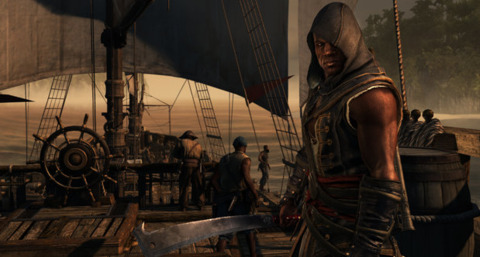It's not over, but it might as well be. The moment I've been asked to finalize my ten games for the year, it makes the rest of the days...fuzzy.

I'm still playing through Assassin's Creed IV: Black Flag, for example, but it no longer has any impact on my list. It doesn't matter if I like the game more or like the game less, the list has been finalized, and once the list has been finalized, what's the point in playing video games anymore?!
Lists are a weird thing, though, and I know people have mixed feelings on them. The group lists are, in my estimation, the way weirder set to cobble together. Those are an eclectic mix of horse trading, arguments, and compromising to come up with a set everyone is not necessarily happy with, but it's a list that everyone can live with. With the personal list, it's all your own nonsense.
But the whole process is really appealing. So often, I talk about games I love with people who also love them, and we're really just talking to one another about how much we like the game. We're coming at it from similar angles. With Game of the Year, what you're advocating for might be knocking off someone else's favorite, and so you need to go beyond explaining why you think it's great, but why everyone should think it's great, and explaining those pieces about a game proves much more difficult to fully articulate.
On the whole, it keeps me sharp. It makes me feel better about my choices. It gives me a better sense of who I am as a player, and why my preferences are what they are (and what they aren't.) Even if you're only publishing them to a blog, I'd recommend you try the same thing!
Hey, You Should Play This
Please enter your date of birth to view this video
By clicking 'enter', you agree to Giant Bomb's
Terms of Use and Privacy Policy
And You Should Read These, Too
- "A Game That Showed Me My Own Black History" by Evan Narcisse

The bigger the game, the more likely it is to avoid touching on, let alone commenting on, sensitive subjects. So when I learned Assassin's Creed IV's Freedom Cry would focus on slavery, you can imagine how curious I was about how Ubisoft might (or might not) handle it. I haven't had a chance to play Freedom Cry yet, but Kotaku writer Evan Narcisse has, and his essay on playing through something so personal is insightful. Narcisse's parents are from Haiti, where part of Freedom Cry is set, and Narcisse's relationship with the idea of slavery has evolved throughout his life. Freedom Cry prompts him to reflect on both.
"Freedom Cry puts you in an early pivotal moment in that aforementioned othering of black people. You'll pass auctions in Port-au-Prince where barkers talk about the slaves as merchandise. One of the game's final levels forces Adéwalé to escape a sinking slave ship that he's unable to save, surrounded by the screaming, burning bodies of people he's called brothers. You'll overhear street chatter where people talk about how it's illegal to teach slaves how to read or that they're animalistic in nature.
These attitudes evolved into legal and economic policies designed to make people of African descent less free. While I played, I kept asking myself if Freedom Cry cheapens the historical horrors of the Triangle Trade to use them in an entertainment like this. For me, it doesn't. The chattel slavery of millions of black people from the 16th to 19th Century is one of the most heinous things in human history. But that doesn't mean that it should be out-of-bounds as source material for pop culture creations."
- "Depression Quest Harassment Campaign" by Christopher Whitman

Here's an excellent example of why I gave my TEDx talk earlier this year. Depression Quest designer Zoe Quinn has endured some of the most horrifying harassment I've ever seen while seeking to have her game approved through Steam's Greenlight service, and for a long time, she decided to keep quiet about it. You don't have to like Depression Quest or think it's a good game, but we can't be comfortable with how someone is treated when they decide to make a game that's "different." Quinn's harassment is the kind of incident we typically sweep under the table because "oh, well, it's just the Internet being the Internet," but it's only that way because we have allowed it to become that way. Most of us have given up on trying to make it better, leaving the terrifying status quo as it stands. It's upsetting, it's wrong. And we have to stand up for these people.
@8vius those dudes got my phone number and jerked off into my phone. That's hardly harmless or "just douchey".
— Zoë “buttlord” Quinn (@ZoeQuinnzel) December 12, 2013
The fucked up thing? This was an accepted risk of putting Depression Quest on greenlight. The same thing happened last time, too.
— Zoë “buttlord” Quinn (@ZoeQuinnzel) December 12, 2013
This is predictable. Unless we call this shit out & fight it when we can, this will continue to be the cost for me to stay in games.
— Zoë “buttlord” Quinn (@ZoeQuinnzel) December 12, 2013
If You Click It, It Will Play
(For some reason, I can't embed videos right now. I'll add 'em if this gets fixed.)
Like it or Not, Crowdfunding Isn't Going Away
- Pixel Poetry is a documentary exploring the idea of video games as art.
- Below Kryll is a 2D platformer with a focus on players collaborating on creation.
- Grapple Knight is a promising game I looked at on Worth Playing a few months back.
Tweets That Make You Go "Hmmmmmm"
I think what's really missing from games coverage is 20somethings w humanties degrees offering business advice to multinational corporations
— Erich Dams (@erichdams) December 18, 2013
Dark Souls is an alternate timeline where in ’95 we decided 3D wasnt for glitz and glamor, but new gameplay possibilities and sense of place
— Zach Gage (@helvetica) December 18, 2013
So once, in another life, I worked for IGN as their Sports Editor. Part of the job was going to video game-run events and interviewing...
— Bill Barnwell (@billbarnwell) December 19, 2013
…athletes, who had been paid to be there. Only once did an athlete at an event get indignant when I asked him whether he liked video games.
— Bill Barnwell (@billbarnwell) December 19, 2013
That athlete was Andrea Bargnani, who was exasperated that I wouldn’t even ask and told me he didn’t play that shit. In EA’s offices.
— Bill Barnwell (@billbarnwell) December 19, 2013
Oh, And This Other Stuff
- Jessica Conditt reports on the intense reaction The Sun at Night received from Russians.
- Amanda Lange writes about the different ways we play and perceive games.
- April Lyn-Caouette relates her surprising response to Luxuria Superbia: sex.
- Over at Edge, Fumito Ueda opens up just a tiny bit about the development of The Last Guardian.
- Mattie Brice talks about the difficulties in being confused with other queer game developers.
- Simon Parkin explains his favorite games from 2013 over at The New Yorker.
- Maddy Myers breaks down two games that undermine how we usually think about games.
- Mary Hamilton has mounted a defense of the term "gamer."
- The amount of stuff hidden inside Double Fine's Hack 'n Slash announcement is crazy.
- Taylor Cocke proposes eSports players need to ditch online names.
- Jeremy Parish reveals how he secretly tried to purchase and reboot 1UP.